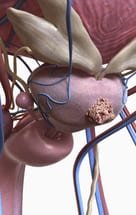Prostate Cancer
 Prostate cancer is one of the most common types of cancer in men. It affects the prostate, the gland located under the bladder and in front of the rectum that, among other functions, helps produce semen, and allows sperm to move effectively. Although prostate cancer can be life-threatening, it often spreads slowly and requires minimal treatment. When confined to the prostate gland, it can usually be treated effectively, making early detection crucial.
Prostate cancer is one of the most common types of cancer in men. It affects the prostate, the gland located under the bladder and in front of the rectum that, among other functions, helps produce semen, and allows sperm to move effectively. Although prostate cancer can be life-threatening, it often spreads slowly and requires minimal treatment. When confined to the prostate gland, it can usually be treated effectively, making early detection crucial.
Risks Factors for Prostate Cancer
The specific cause of prostate cancer is unknown, although a combination of hereditary, hormonal and environmental factors is suspected. Certain factors cause men to be at higher risk for developing prostate cancer, including the following:
- Aged 65 and older
- Smoker
- African-American
- Family history of prostate cancer
- Diet high in fat and sugar
Symptoms of Prostate Cancer
Many patients with prostate cancer do not have any noticeable symptoms while it is in its early stages. As the disease progresses, however, patients may experience the following:
- Trouble urinating
- Slowed urine stream
- Starting and stopping while urinating
- Blood in the urine
- Swelling in legs
- Bone pain
- Loss of appetite or weight
These symptoms are often not related to cancer, but to infections or other health problems. A doctor should be contacted at the first sign of any symptoms.
Diagnosis of Prostate Cancer
In addition to a physical examination, there are several tests that are used to diagnose prostate cancer:
- Digital rectal exam
- Urinalysis
- Prostate-specific antigen (PSA) test
- Biopsy
A biopsy determines whether one or both (left and/or right) sides of the prostate gland are affected.
Treatment of Prostate Cancer
Treatment is most successful when prostate cancer is identified at an early stage, before it has spread to other areas. The best treatment method depends on the age and overall health of the patient, grade of the tumor, and stage of the cancer.
Active Surveillance
With an early diagnosis of prostate cancer, active surveillance may be suggested. During active surveillance, the cancer is carefully monitored for signs of progression.
Chemotherapy
Chemotherapy may be used to treat prostate cancer. Chemotherapy uses drugs to stop cells from dividing, slowing the growth of the tumor.
Radiation
Radiation therapy is an effective option for treating prostate cancer. Radiation is used to target the affected area of the prostate.
Hormone Therapy
The hormone testosterone serves as the main fuel for the growth of prostate cancer cells. Hormone therapy is used to stop testosterone from being released, and to prevent it from acting on the prostate cells.
Surgery
Surgery may be recommended to treat severe cases of prostate cancer. The tumor is removed using an open or laparoscopic procedure, which may include removing all or part of the prostate.
In some cases, doctors may prescribe a combination treatment plan, which uses several of the treatments listed above.
Prevention of Prostate Cancer
Although prostate cancer cannot be prevented, patients can reduce their risk of developing it by maintaining an active and healthy lifestyle. Diet and lifestyle changes have been shown to reduce the risk of prostate cancer's development and progression, and can help men with prostate cancer live longer and more productive lives.










